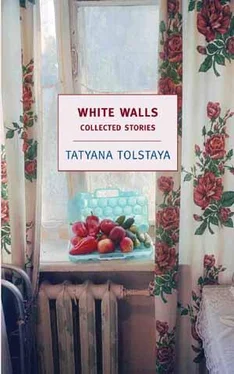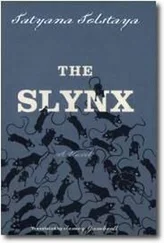In the evenings Natasha played poker with yellow, tobacco-permeated Konkordia Benediktovna, who gave her advice on how to dress; Konkordia Benediktovna herself wore a dark, glinting brooch at her breast, she fetched large faceted beads horn little boxes, turned cups over, and tapped her fingernail against the porcelain bottoms with their pale blue pedigree stamps—antiques, ancient antiques. Natasha gazed at the worn little cards and wanted to look like the Russian Queen of Diamonds—soft, blue-eyed, dressed in a white gathered head scarf and a sable vest. The old widower Gagin would stop in, looking like a graying crane in a red muffler; every year he drew a crazed Santa Claus and a violently lunatic Snow White for the windows of the vegetable store: mammoth, red-faced, ready to take on anything, they raced furiously through a curly blizzard on princely sleighs with silver spangles.
In the morning there was the humiliating visit to the toilet with its oozing pistachio walls, carefully torn rectangles of Socialist Industry or The Week, and a swaying dog-leash chain ending in an old-fashioned porcelain pear, on which some wise Englishman, to help things along, had written the black word “Pull” in English and had even drawn a tiny pointing hand in a black cuff: which direction to pull. But just for fun, the cheerful plumber always deliberately disobeyed the Englishman’s directions, and while Natasha fumed indignantly in the slime-covered isolation booth, old lady Morshanskaya, ailing and disheveled in her nightgown, was already pounding on the door, shouting in her whiskered voice:
“Have some consideration for old people!… Natalia, is that you?…. Your insides will fall out!…”
The bathroom window opened onto the back stair, and old lady Morshanskaya, fearing an attack by Young Pioneer scouts out collecting materials for recycling, barricaded it with a wooden washtub—the very same cracked one, the last hand-me-down from the Magic Golden Fish. The bathroom was used exclusively for washing clothes—they went to the baths to wash themselves. Natasha went as well: she looked at the strange, undressed women, pink, like wet ham, and found fault with them all. Once, in the steam room, on the slippery, sloping floor, the fat, naked high-school headmistress passed by with a wet knot of hair on her forehead and a tub tucked under her arm like a class register, the same headmistress who, that very morning, had sternly declared: “We, pedagogues, collectively recognize.” And long afterward, whenever the headmistress—her face purple, her medal clinking—yelled at adolescents who giggled during the ceremonial lineup, all Natasha could see was the horrid, red, distended creature that shuffled hurriedly past along the wet, terra-cotta tile.
On the summer boulevards sat old women who had known a better life: gilded cups, the frosty flora of lace hems, the tiny ant-like facets of foreign fragrance vials, and perhaps—indeed, most likely—secret lovers; they sat with one leg crossed over the other, their gaze lifted to where the heavenly evening theater silently lavished burning crimsons, golden treasures; and the loving western light crowned the blue hair of these former women with tea roses.
But nearby, heavily spreading their swollen legs, with drooping hands and drooping heads wrapped in dotted kerchiefs, flames all snuffed out, like dead swans sat those who had lived for years in brown communal kitchens, in dim corridors, those who had slept on iron frame beds next to deep-set windows, where beyond the speckled blue casserole, beyond the heavy smell of fermentation, beyond the tearstained glass, another person’s wall darkens and swells with autumn anguish.
And Natasha began to dream: if old age must come to me as well, then let me turn into a clean, pink, white-haired old lady, a beloved schoolteacher, kind and funny, like a hot cross bun. But she wasn’t made to be a hot cross bun and so was obliged to become a stooped, muddy-gray old lady with jowls.
She only made it to Moscow once, by chance. In a taxi, scared stiff, she zoomed along the nighttime streets squeaky with frost; she gazed up at the enormous buildings—rearing black chests of drawers, the gloomy castles of vanished titans, gigantic honeycombs crowned with bloody embers standing guard. And in the morning she looked out of the hotel window onto a hushed thaw, the soft, gray day, the jumble of little two-story yellow buildings and annexes pierced by morning lights—muslin is drawn back from a small window, a kettle whistles, a grandmother in felt boots entertains her grandson with white rolls— sweet, soft, Russian Moscow!
She immediately wanted to live there, wanted to exhale frosty steam in the small lanes, clear little paths in the snowdrifts, wear loose, ample blouses untucked, drink tea with hard round pretzels purchased in a little, ruddy, golden shop.
Elated by the strong morning air, by Moscow’s slapdash shabbiness, by the smoldering geranium lampposts in low windowsills, Natasha awoke, threw her arms open wide, laughed, and fell in love—swiftly and uninhibitedly, on meeting the bearded, sandy-haired Pyotr Petrovich from the city of Izium, who had come to Moscow to go shopping. Happy, she laughed, leaning her chest on the table of the dumpling shop, and watched with shining eyes as Pyotr Petrovich heartily tossed the steaming white blobs into his large mouth; she trotted around to stores with the cheerful Iziumer like a dog, waved from long lines, helped him lug blue shoeboxes, elbowed her way through to the steep Eliseevsky counter windows, and in the crowd accidentally pressed her cheek to the wide, fragrant back of that beloved sheepskin coat.
And Pyotr Petrovich, unaware, laughed joyfully, turned around toward Natasha as he swayed in the roaring surf at the counters of Children’s World, and in a booming voice called through the storm of heads: “Miss! Over here, Miss! Give me a tabletop ring toss.” And from afar he raised his victorious hands and linked them over his head, nodding to Natasha: I’m alive, alive, I bought it, await me on the shore….
And at the station, near the train to Izium, he shook Natasha’s hand joyfully: Thank you, you’re a wonderful woman, come visit Izium, you’ll get on splendidly with my wife, you’ll meet my children….
Pyotr Petrovich sank, Natasha howled like a wolf after the departing green train, and her howl—a wartime, train station howl—flew over the ringing rails, over the redbrick barracks, over the cruel, bitter-cold earth. And behind Natasha, holding her firmly by the shoulder, stood old age, like a stern, patient doctor who has prepared his usual instruments.
She began to like gray goosedown scarves, to be pickier about her shoes: were they well-cut, did they pinch? She went to visit old lady Morshanskaya, and inspected her boxes of homeopathic remedies: sulfur iodine, salvia, hamamelis. For the old woman’s birthday she gave her an enema bag: light blue, cheerful, with a relief drawing: little bouquets of lily of the valley against a sunrise. Konkordia Benediktovna returned from visiting her sister in Paris and brought Natasha a red plastic spoon. The widower Gagin would drop in with a crossword puzzle: Now then, Natasha, this is your territory—a river in Kazakhstan, five letters, ending with “sh”?
At New Year’s, Gagin drank champagne and offered Natasha his heart and hand; Natasha laughed, Gagin laughed too; he was a jovial old man, and every year his drunken Santa Clauses and pedigree milk-cow Snow Whites turned out cheerier and cheerier.
Natasha moved the buffet and remembered Konovalov; at first he flared like a blue spark in the dark, then he flew in more and more often, hovered in the air, blotted his nose, and timidly disappeared if someone knocked at the door. While canning tomatoes, throwing the whole weight of her body onto the stiff lids of the jars, Natasha imagined how Konovalov, gratefully surprised, would fish out a soft, cool, dripping ball with two fingers, and ask for seconds.
Читать дальше












